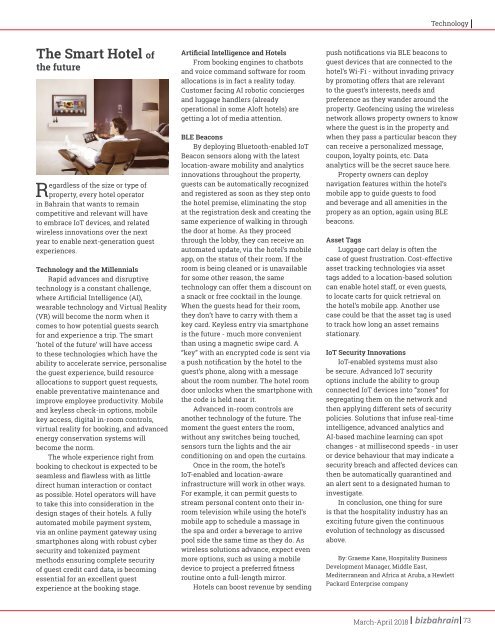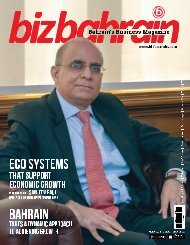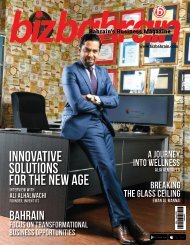Create successful ePaper yourself
Turn your PDF publications into a flip-book with our unique Google optimized e-Paper software.
Technology<br />
The Smart Hotel of<br />
the future<br />
Regardless of the size or type of<br />
property, every hotel operator<br />
in Bahrain that wants to remain<br />
competitive and relevant will have<br />
to embrace IoT devices, and related<br />
wireless innovations over the next<br />
year to enable next-generation guest<br />
experiences.<br />
Technology and the Millennials<br />
Rapid advances and disruptive<br />
technology is a constant challenge,<br />
where Artificial Intelligence (AI),<br />
wearable technology and Virtual Reality<br />
(VR) will become the norm when it<br />
comes to how potential guests search<br />
for and experience a trip. The smart<br />
‘hotel of the future’ will have access<br />
to these technologies which have the<br />
ability to accelerate service, personalise<br />
the guest experience, build resource<br />
allocations to support guest requests,<br />
enable preventative maintenance and<br />
improve employee productivity. Mobile<br />
and keyless check-in options, mobile<br />
key access, digital in-room controls,<br />
virtual reality for booking, and advanced<br />
energy conservation systems will<br />
become the norm.<br />
The whole experience right from<br />
booking to checkout is expected to be<br />
seamless and flawless with as little<br />
direct human interaction or contact<br />
as possible. Hotel operators will have<br />
to take this into consideration in the<br />
design stages of their hotels. A fully<br />
automated mobile payment system,<br />
via an online payment gateway using<br />
smartphones along with robust cyber<br />
security and tokenized payment<br />
methods ensuring complete security<br />
of guest credit card data, is becoming<br />
essential for an excellent guest<br />
experience at the booking stage.<br />
Artificial Intelligence and Hotels<br />
From booking engines to chatbots<br />
and voice command software for room<br />
allocations is in fact a reality today.<br />
Customer facing AI robotic concierges<br />
and luggage handlers (already<br />
operational in some Aloft hotels) are<br />
getting a lot of media attention.<br />
BLE Beacons<br />
By deploying Bluetooth-enabled IoT<br />
Beacon sensors along with the latest<br />
location-aware mobility and analytics<br />
innovations throughout the property,<br />
guests can be automatically recognized<br />
and registered as soon as they step onto<br />
the hotel premise, eliminating the stop<br />
at the registration desk and creating the<br />
same experience of walking in through<br />
the door at home. As they proceed<br />
through the lobby, they can receive an<br />
automated update, via the hotel’s mobile<br />
app, on the status of their room. If the<br />
room is being cleaned or is unavailable<br />
for some other reason, the same<br />
technology can offer them a discount on<br />
a snack or free cocktail in the lounge.<br />
When the guests head for their room,<br />
they don’t have to carry with them a<br />
key card. Keyless entry via smartphone<br />
is the future - much more convenient<br />
than using a magnetic swipe card. A<br />
“key” with an encrypted code is sent via<br />
a push notification by the hotel to the<br />
guest’s phone, along with a message<br />
about the room number. The hotel room<br />
door unlocks when the smartphone with<br />
the code is held near it.<br />
Advanced in-room controls are<br />
another technology of the future. The<br />
moment the guest enters the room,<br />
without any switches being touched,<br />
sensors turn the lights and the air<br />
conditioning on and open the curtains.<br />
Once in the room, the hotel’s<br />
IoT-enabled and location-aware<br />
infrastructure will work in other ways.<br />
For example, it can permit guests to<br />
stream personal content onto their inroom<br />
television while using the hotel’s<br />
mobile app to schedule a massage in<br />
the spa and order a beverage to arrive<br />
pool side the same time as they do. As<br />
wireless solutions advance, expect even<br />
more options, such as using a mobile<br />
device to project a preferred fitness<br />
routine onto a full-length mirror.<br />
Hotels can boost revenue by sending<br />
push notifications via BLE beacons to<br />
guest devices that are connected to the<br />
hotel’s Wi-Fi - without invading privacy<br />
by promoting offers that are relevant<br />
to the guest’s interests, needs and<br />
preference as they wander around the<br />
property. Geofencing using the wireless<br />
network allows property owners to know<br />
where the guest is in the property and<br />
when they pass a particular beacon they<br />
can receive a personalized message,<br />
coupon, loyalty points, etc. Data<br />
analytics will be the secret sauce here.<br />
Property owners can deploy<br />
navigation features within the hotel’s<br />
mobile app to guide guests to food<br />
and beverage and all amenities in the<br />
propery as an option, again using BLE<br />
beacons.<br />
Asset Tags<br />
Luggage cart delay is often the<br />
case of guest frustration. Cost-effective<br />
asset tracking technologies via asset<br />
tags added to a location-based solution<br />
can enable hotel staff, or even guests,<br />
to locate carts for quick retrieval on<br />
the hotel’s mobile app. Another use<br />
case could be that the asset tag is used<br />
to track how long an asset remains<br />
stationary.<br />
IoT Security Innovations<br />
IoT-enabled systems must also<br />
be secure. Advanced IoT security<br />
options include the ability to group<br />
connected IoT devices into “zones” for<br />
segregating them on the network and<br />
then applying different sets of security<br />
policies. Solutions that infuse real-time<br />
intelligence, advanced analytics and<br />
AI-based machine learning can spot<br />
changes - at millisecond speeds - in user<br />
or device behaviour that may indicate a<br />
security breach and affected devices can<br />
then be automatically quarantined and<br />
an alert sent to a designated human to<br />
investigate.<br />
In conclusion, one thing for sure<br />
is that the hospitality industry has an<br />
exciting future given the continuous<br />
evolution of technology as discussed<br />
above.<br />
By: Graeme Kane, Hospitality Business<br />
Development Manager, Middle East,<br />
Mediterranean and Africa at Aruba, a Hewlett<br />
Packard Enterprise company<br />
March-April <strong>2018</strong><br />
73

















